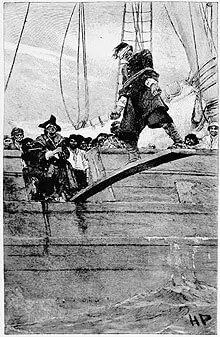‘Walking the plank’ was a form of naval execution in which victims were forced to walk, often blindfold and with hands tied, off a plank of wood and into the sea.
Walk the plank
What's the meaning of the phrase 'Walk the plank'?
What's the origin of the phrase 'Walk the plank'?
Walking the plank is as much a part of pirate folklore as eye-patches, peg-legs and squawking parrots, and the scene of hapless victims being prodded by cutlass-wielding pirates and ‘walking the plank’ to their certain death has often been used as a dramatic device in stories and films. It isn’t just a fiction; ‘walking the plank’ was really used as a form of impromptu execution in the 18th and 19th centuries.
Some reports date the phrase from 1769 when it is said that a seaman called George Wood confessed to a chaplain in Newgate Prison the he and his shipmates had forced others to ‘walk the plank. These reports derive from Douglas Botting’s authoritative book The Pirates, 1978. Whether this is a true report of an actual event is open to considerable doubt. Botting himself doesn’t set much store by it, describing the ‘alleged confession’ as ‘an obscure account … which may or may not be true, and in any case had nothing to do with pirates’.
There are documentary records of the phrase’s use dating from the late 18th century. Grose’s Classical Dictionary of the Vulgar Tongue, 1788, defined the term:
WALKING THE PLANK. A mode of destroying devoted persons or officers in a mutiny on ship-board, by obliging them to walk on a plank laid over the ship’s side; by this means, as the mutineers suppose, avoiding the penalty of murder.
The following year, a summary of a committee of the UK House of Commons took evidence from a John Barnes, Esquire, who was Governor of Senegal from 1763 to 1766. They published the committee minutes under the title Abridgement of the Minutes of the Evidence, Taken Before a Committee of the Whole House, To Whom it was Referred to Consider of the Slave-Trade, 1789. The events that Barnes described took place in 1788:
The food, notwithftanding the mortality, was fo little, that if ten more days at fea, they fhould, as the captain and others faid, have made the flaves walk the plank, that is, throw themfelves overboard, or have eaten thofe flaves that died.
It isn’t surprising that the captain also reported that the slaves “fang fongs of forrow”.
See other phrases first recorded by Captain Francis Grose.
See also: shiver my timbers.
The history of “Walk the plank” in printed materials
Trend of walk the plank in printed material over time
Related phrases and meanings
Browse more Phrases
About the Author

Phrases & Meanings
A-Z
A B C D E F G H I J K L M N O P Q R S T UV W XYZ
Categories
American Animals Australian Bible Body Colour Conflict Death Devil Dogs Emotions Euphemism Family Fashion Food French Horses ‘Jack’ Luck Money Military Music Names Nature Nautical Numbers Politics Religion Shakespeare Stupidity Entertainment Weather Women Work
How did we do?
Have you spotted something that needs updated on this page? We review all feedback we receive to ensure that we provide the most accurate and up to date information on phrases.
